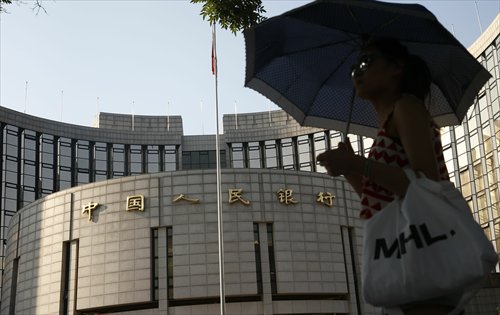Decline in foreign reserves slows
Contraction continues for fifth month in September, PBC figures show

A woman walks past the headquarters of the People's Bank of China, the central bank, in Beijing. File photo: CFP

China's foreign exchange reserves fell by $43.3 billion in September to $3.51 trillion, a decrease of $50 billion compared with the decline during the previous month, according to data released Wednesday by the People's Bank of China (PBC), the country's central bank.
The drop marked the fifth consecutive month of decline.
The nation's foreign exchange reserves, which are the world's largest, slid by $93.9 billion in August, the biggest monthly fall on record, data from the PBC showed on September 7. The PBC reported reserves had dropped to $3.56 trillion in August, having descended from a record $3.99 trillion in June 2014.
Analysts said that the drop in foreign exchange reserves was caused by capital outflows and the PBC's intervention to stabilize the yuan after a devaluation in August.
On August 11, the PBC announced that it would set the yuan's central parity rate against the US dollar based on market quotes and the previous trading day's closing level to better reflect market forces.
"The capital outflows escalated because of fears over the depreciation of the yuan," Xu Gao, the chief economist at Everbright Securities, told the Global Times Wednesday.
Xu said that the government will be able to stabilize the currency's exchange rate because the nation's foreign reserves are still substantial.
The latest decline in the foreign exchange reserves reflected the slowdown of capital outflows in September amid clearer signs of policy support for the yuan and the macro-prudential regulations intended to slow such outflows, news portal wallstreetcn.com reported Wednesday, citing a report by the Goldman Sachs Group Inc.
The PBC explained on September 8 that the reserve drop in August was largely due to the increase of foreign exchange assets held by other entities within the country.
The foreign exchange deposits of domestic enterprises and individuals continued to rise in August, with an increase of $27 billion over the previous month, the PBC said in a statement released on September 8.
"As the capital account is not freely traded at present, a large amount of capital cannot be withdrawn from China, and most of the loss in foreign exchange reserves was the result of actions by local residents," Luo Yuding, acting dean at the School of Business at the Shanghai University of Finance and Economics, told the Global Times Wednesday.
The PBC also stressed in the statement that financial institutions still have ample liquidity when it comes to foreign exchange.
An increase in these institutions' foreign-currency assets has helped to diversify the asset allocation of other firms, local residents and financial institutions, which in turn has helped promote balance in the country's international payments, said the PBC.
Luo said, however, that the decline in foreign exchange reserves this month will be larger than in September and August.
Lots of Chinese residents traveled abroad and spent heavily in foreign markets during the National Day holiday period, Luo said. To spend abroad, they had to use yuan to buy foreign currencies, which led to a continuing fall in reserves.
Reserves could continue to decline if the depreciation of the yuan persisted, Luo added.
"Speculation about further depreciation of the yuan had been losing steam and the foreign exchange market had basically stabilized the exchange rate of the yuan," Xu said, noting that the decline in foreign exchange reserves was likely to be brought under control in the short term.
There is no basis for persistent depreciation of the yuan and the depreciation is only a short-term trend, and China will continue to record current-account surpluses, news portal sina.com reported Wednesday, citing research from Minsheng Securities.
Although China's pace of economic expansion has slowed, its growth rate still leads the world, according to the report.